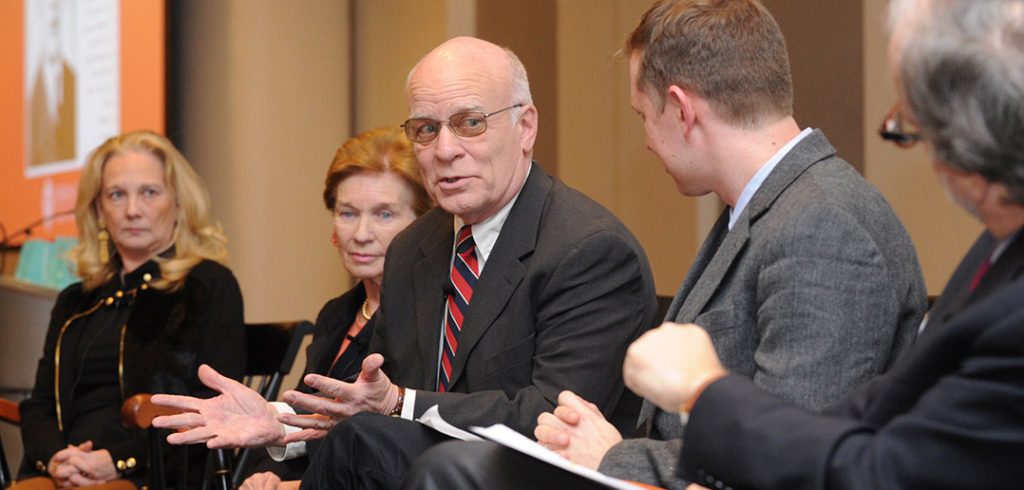One morning decades ago, James B. Donovan and his daughter were sharing a cab on the way into Manhattan, where she attended high school, when she noticed him rubbing his hands together.
“I said, ‘Dad, what’s going on? Is this something big?’” said Donovan’s daughter, Jan Donovan Amorosi. “He said, ‘Yes, but I can’t talk about it.’”
That vignette emerged at a Feb. 9 Fordham event that showed what it was like to grow up with a father whose pursuit of duty and high principle took him deep into the world of closely guarded Cold War secrets.
Donovan was apparently good at keeping them: “That was literally the only hint I ever had that something … very big was coming up,” said Amorosi.
She spoke as part of a panel discussion and screening of Bridge of Spies, the Oscar-nominated Steven Spielberg film starring Tom Hanks as Donovan, who was a 1937 Fordham graduate.
Donovan was a nationally prominent insurance lawyer who faced heated criticism—including threats and charges of being a “commie lover”—when he agreed to represent accused Russian spy Rudolf Ivanovich Abel. He successfully argued against the death penalty for Abel and, later, traveled to East Berlin to negotiate the swap of Abel for Americans being held in the Soviet Bloc—after telling his wife he’d be visiting friends in Scotland.
By putting Abel’s due process rights above both his own and the country’s anticommunist sentiment, Donovan showed that he “truly was a man of principles,” said Jim Jennewein, Hollywood screenwriter and artist in residence at Fordham, one of the panelists.
“That’s one of the reasons why … his story is so interesting,” Jennewein said. “He is as bound by his principles as he is by his patriotism, so he’s in constant conflict between these two poles.”
Also on the panel were Donovan’s son, John Donovan; his granddaughter, Beth Amorosi; and Fordham history professor Christopher Dietrich, PhD.
There were lighter moments, as when John Donovan described an exchange between his parents about all the time his father was spending on his work. “My father said to her, ‘If you are accused of a capital crime, I will reverse the division of my time,’ and then she said, ‘You’ll find that difficult if you’re the victim of a capital crime,’” Donovan said, to laughter.
There’s a strong Fordham connection in the Donovan family, John Donovan said, noting that his great-uncle attended Fordham Law School and his great-grandfather was an adjunct at the medical school Fordham operated early in the 20th century. And on his mother’s side of the family is Archbishop John Hughes, the founder of Fordham, he said.
Donovan was “profoundly influenced by his Jesuit education,” John Donovan said. Beth Amorosi said the movie very effectively portrays her grandfather’s “humanitarian instincts in approaching very complex and quite difficult situations and quite difficult people with competing ideologies.”
After negotiating the spy swap, Donovan met several times with Fidel Castro to secure the release of Cubans captured in the United States’ failed Bay of Pigs invasion. And his career of service began with another seminal event, the Nuremberg trials, where he served as an assistant prosecutor and played a key role in assembling film footage of Nazi atrocities.
“If we hadn’t had those films, the question arises: Would our memory have faded much sooner of the horrors of World War II?” Jennewein asked. “That is part of Jim Donovan’s legacy.”

